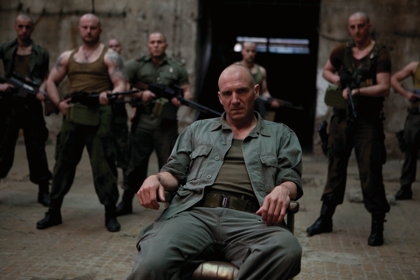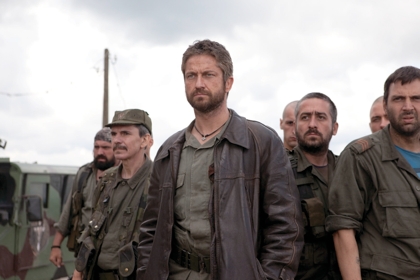Film review: Coriolanus

Ralph Fiennes’s bold modern adaptation of Shakespeare’s caustic late combat drama makes a strong fist of merciless material, says David Jays
Coriolanus has never previously been adapted for the cinema, and there’s a reason for that. Not only is Shakespeare’s late-period verse complex, but the unsympathetic hero is an arrogant killing machine in thrall to a formidable mother (Shakespeare scholar Jonathan Bate describes him as “Peter Pan in full body armour”). It’s daunting material for Ralph Fiennes’s arresting directorial debut, but his choices are always intelligent, even if the astringent play remains at arm’s length.
Many screen Shakespeares occupy fantastical worlds (Julie Taymor’s The Tempest, Baz Luhrmann’s Romeo + Juliet) or lush period settings (Kenneth Branagh’s movies), but Fiennes’s film looks quite different. There’s no classical grandeur to this Rome (the film was shot in Belgrade) – it’s a grimy, modern cityscape ridden with graffiti, rubble and the grey pall of deprivation. Director of photography Barry Ackroyd, who has worked with Paul Greengrass and on Kathryn Bigelow’s The Hurt Locker, establishes a panicky, documentary atmosphere – his cameras, caught up in angry demonstrations and tense combat, lunge about to keep up with the flurried action.
After a blood-welted opening, the film sinks into murky political bargaining. The impetus slackens, but Fiennes and screenwriter John Logan (Gladiator) scrape back the knotty text, distilling the sense of integrity at bay. In a world of rolling news, Coriolanus is unable to develop a camera-friendly persona: images of his scarlet face, steaming with fury, fill the screen. As well as video-messaging and hostage-killing staged for the camera, headline banners on the ubiquitous ‘Fidelis’ news channel keep us up to speed, aided by some distinguished verse-speaking from newscaster Jon Snow.
Fiennes both directs and stars: he’s an impressively unsympathetic actor, and Coriolanus’s chilly contempt suits him (he played the role in 2000 in a temporary theatre in London’s then disused Gainsborough film studios). The general’s tongue-lashing disdain, delivered with furious clarity, scours both opponents and his own troops – but Fiennes also digs into a will to self-annihilation. Rather than hear himself extolled before the senate, he scurries from the chamber to a deserted corridor. The scarred terrain of his torso suggests a man shaped for war; his glassy eyes, unflinching at slaughter, can’t look on compromising peace. His death – the corpse unceremoniously dumped on a truck (unlike the text’s solemn ending) – seems inevitable.

Productions of the play frequently pick up a homoerotic note between Coriolanus and his admired adversary Aufidius (especially Elijah Moshinsky’s panting 1984 BBC version). There’s a gruff intimacy here too: Fiennes and Gerard Butler’s Aufidius gouge and grunt in sweaty combat, crashing through a window wrapped about each other. Later, Aufidius tenderly shaves his erstwhile enemy’s head, and the final killing in a roadside ambush is the closest thing we see to a cuddle.
Combat is Coriolanus’s element: Rome’s political horse-trading frustrates him. A solid British cast lends gravitas to these muttered convocations in bars and corridors – especially Brian Cox as a rumpled senator and James Nesbitt and Paul Jesson as opportunistic tribunes. Vanessa Redgrave gives Coriolanus’s adamantine mother echoes of Angela Lansbury’s hawkish matriarch in The Manchurian Candidate (1962). “Anger’s my meat,” she spits. “I sup upon myself.” Fiennes foregrounds Coriolanus’s near-silent wife (Jessica Chastain), a lone dove in this world of hawks and Roman eagles. Opening the bathroom door to find Coriolanus’s mother tending his wounds, she backs away as if intruding, but finds no sanctuary amid the toy armoury of her young son’s bedroom. Fiennes creates a pitiless world without refuge, where neither the soft nor the unbending can survive.
See also
Mystic Mathieu: Davina Quinlivan on Amalric’s The Screen Illusion, a modern adaptation of Pierre Corneille’s L’illusion comique (October 2011)
Thor reviewed by Kim Newman (April 2011)
Storm in a bottle: Nick James on Julie Taymor’s The Tempest at the Venice Film Festival (September 2010)
Me and Orson Welles reviewed by Nick Bradshaw (January 2010)
The right trousers: Ralph Fiennes talks to Nick James about acting in David Cronenberg’s Spider (January 2003)
Titus reviewed by John Wrathall (October 2000)
Sunshine reviewed by Julian Graffy (May 2000)
10 Things I Hate About You reviewed by Peter Matthews (July 1999)
Shakespeare in Love reviewed by Philip Kemp (February 1999)



